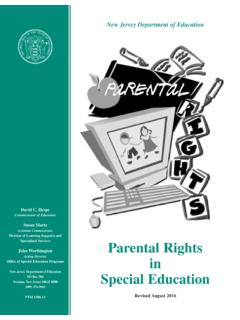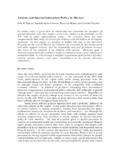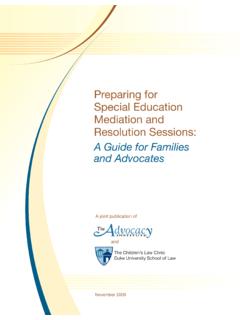Transcription of SPECIAL EDUCATION IN MASSACHUSETTS
1 SPECIAL EDUCATION . IN. MASSACHUSETTS . Children's Law Center of MASSACHUSETTS 298 Union Street Lynn, MA 01901. (781) 581-1977. *updated February 2013. Introduction .1. When is a student eligible for SPECIAL EDUCATION services? ..1. Who can refer a student for a SPECIAL EDUCATION evaluation? ..2. Who is authorized to act as a Parent? .2. How soon must the evaluations be completed and discussed? ..2. What kind of testing must the school district perform? ..3. Must a parent consent to the proposed evaluations? ..3. What is involved in the evaluation process? ..3. What if a parent disagrees with the results of the school's assessments? ..4. Independent Evaluation Rights Under MASSACHUSETTS Law ..4. Independent Evaluation Rights Under Federal Law ..4. Independent Evaluations at Private Expense .5. How often must child who receives SPECIAL EDUCATION services be re-evaluated? ..5. What is a SPECIAL EDUCATION Team?
2 5. What happens at a Team meeting? .6. What if a parent disagrees with a Team decision about a child's eligibility for SPECIAL EDUCATION services? 7. What is an Individualized EDUCATION Program? ..7. How is the child's educational placement determined? ..8. What happens after the Team meeting? ..8. What is the effect of the parent rejecting all or part of the proposed IEP? .9. The child's program after an IEP is rejected ..9. What are the School District's obligations if the parent does not respond to a proposed IEP? ..10. What are the rights of parents and students under IDEA? 10. How do the parents and school resolve disagreements over an IEP? ..11. i INTRODUCTION. Under state and federal law, children with disabilities that affect their educational progress have rights to academic programming designed to meet their unique needs. They only are eligible for SPECIAL EDUCATION services if they need specially designed instruction in order to make effective progress and/or if they need related services in order to access the general curriculum.
3 SPECIAL EDUCATION involves federal and state law. MASSACHUSETTS ' laws governing this entitlement, often referred to as Chapter 766, can be found in the MASSACHUSETTS General Laws Chapter 71B; the related regulations are found in the Code of MASSACHUSETTS Regulations, Chapter 28 of title 603. The major federal law governing SPECIAL EDUCATION is the Individuals with Disabilities EDUCATION Act, (IDEA) found at Title 42 of the United States Code, part 1400;. the federal regulations are at Title 34 of the Code of Federal Regulations, Part 300. The following is a guide to the rights of children with disabilities who are entitled to SPECIAL EDUCATION , and some important terms that should help you to understand SPECIAL EDUCATION in MASSACHUSETTS . This packet of information is intended to be a guide only; you should consult an attorney for specific information concerning your child's case. Please note that the IDEA was most recently reauthorized as the Individuals with Disabilities EDUCATION Improvement Act of 2004.
4 Most of its provisions are in effect beginning July 1, 2005. New federal regulations should be issued in the Summer of 2005 and should provide additional guidance on how the law will be implemented. MASSACHUSETTS law is still in effect and may give children additional rights. This packet does its best to incorporate provisions of both state and federal law applicable to SPECIAL EDUCATION . WHEN IS A STUDENT ELIGIBLE FOR SPECIAL EDUCATION SERVICES? A student is eligible for SPECIAL EDUCATION or related services, if 1. the child is aged 3 to 21, and 2. the child has a disability consisting of one or more of the following impairments: autism developmental delay intellectual impairment sensory impairment (hearing, vision). neurological impairment emotional impairment communication impairment physical impairment health impairment (includes ADD/ADHD). specific learning disability and 3. as a result of the disability, the child is unable to make effective progress in the general EDUCATION program, and 4.
5 The child requires specially designed instruction in order to make effective progress and/or the child requires related services in order to benefit from SPECIAL EDUCATION or in order to access the general curriculum. 1. WHO CAN REFER A STUDENT FOR A SPECIAL EDUCATION EVALUATION? Schools have a duty to identify and assess the needs of children who may be eligible for SPECIAL EDUCATION services. However, a student may be referred for a SPECIAL EDUCATION evaluation by a parent, any person in a care giving position, or any person in a professional position who is working with that child. This can be a doctor, a teacher, a day care provider, a coach, etc. WHO IS AUTHORIZED TO ACT AS A PARENT? The term Parent includes: 1) a natural, adoptive, or foster parent (unless state law prohibits foster parents from acting as parents); 2) a legal guardian (except where the child's legal guardian is the state); 3) an individual acting in the place of a natural or adoptive parent (including but not limited to grandparent, stepparent, or other relative) with whom the child is living; 4) a person who is legally responsible for the child's welfare; or 5) a surrogate parent appointed under the statute.
6 There are SPECIAL rules for children who are Wards of the State. A ward of the state is defined as a child who is in foster care or is in the custody of a public child welfare agency who does not have a foster parent who meets the definition of parent described above. A Surrogate Parent is an individual who is assigned by the state or the court overseeing the child's care, to act in place of the parents. The individual assigned cannot be an employee of the state department of EDUCATION , the local school district, or any other agency that is involved in the EDUCATION or care of the child. Surrogate parents can be appointed when: 1) no parent can be located; 2) the child is a ward of the state; and 3) the child is an unaccompanied homeless youth as defined by the McKinney-Vento Homeless Assistance Act. A surrogate parent should be assigned within 30 days of the determination that a child needs one.
7 Note: there are specific rules relating to issues of domestic violence, restraining orders, and non- custodial parents, please check the regulations for these provisions HOW SOON MUST THE EVALUATIONS BE COMPLETED AND DISCUSSED? If a student is referred for a SPECIAL EDUCATION evaluation, a school district must request parental consent for the evaluation within 5 days of receiving the referral. Generally, school districts do this by sending parents a form requesting permission to test the child. The parents must provide written consent before the school district can begin testing. The school district also must consult with parents about the content of the testing and the evaluators being used. The school district must complete its assessments within 30 school working days of receiving parental consent for testing. Once the school's tests are complete, an educational Team meeting must be scheduled.
8 This Team meeting must be scheduled within 45 school working days of receiving parental consent for testing. The parents can and should request (in writing). reports or summaries of the results of the tests in advance of the Team meeting. After a request is made, the school district must make copies of the reports of testing available to parents 2 days 2. before the Team meeting. Note that assessments MUST include not only a description of the evaluator's findings, but also WRITTEN, specific and detailed recommendations designed to address the child's needs and to assist the child in improving his or her access to the general curriculum. WHAT KIND OF TESTING MUST THE SCHOOL DISTRICT PERFORM? The school must assess a child in all areas related to their suspected disability(ies), and must provide the following assessments: an educational assessment by a representative of the school district a psychological assessment, a health assessment a home assessment an assessment by a classroom teacher a medical assessment by a physician a Braille assessment (if warranted).
9 Additional assessments in all areas related to the suspected disability (for example, speech and language, physical therapy, occupational therapy). Parents should carefully review the consent forms that are sent to them, and in consultation with any of their child's care-givers, add to the form any assessments that they believe may help clarify their child's disability. Some parents may also wish to request early intervention assessments for children age 3 and younger, or functional behavior assessments for children whose behavior is interfering with their learning in school or at home. MUST A PARENT CONSENT TO THE PROPOSED EVALUATIONS? No. The school district must try to obtain informed parental consent before performing its first evaluation for a child with suspected disabilities. The parent does not need to consent to any or every evaluation proposed by the district; the parent can consent only to certain evaluations.
10 In addition, parental consent to an evaluation does not obligate the parent to agree to services or placement of the child in SPECIAL EDUCATION . Note, however, if a parent refuses or fails to respond to a request for consent to an initial evaluation, the district can file for a due process hearing in order to obtain consent from a hearing officer. WHAT IS INVOLVED IN THE EVALUATION PROCESS? The child is evaluated in order to provide the child's educational Team with information to identify whether the child has a disability and if so, what services would allow the child to access the general curriculum. When evaluating a child, school districts must use a variety of assessment tools and strategies to gather relevant functional and developmental information, 3. including information provided by the parents, and information related to enabling the child to progress in the regular curriculum.






